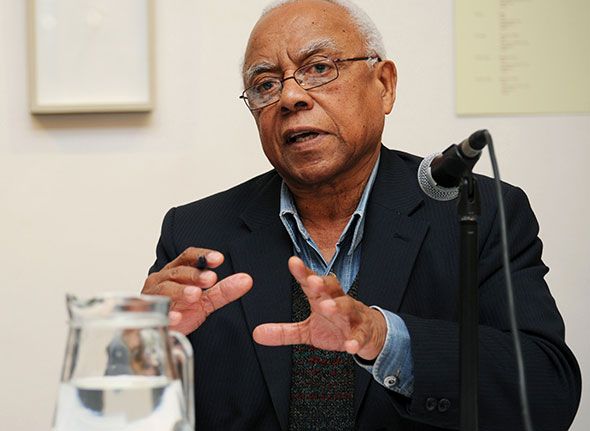Annual Neville Alexander lecture discusses language and decoloniality


The Centre for African Studies in collaboration with the Linguistics section hosted the fifth annual Neville Alexander lecture to discuss how language speaks to the call for decolonisation of the university space. The lecture took place on Friday, 25 August 2017 at the Centre for African Studies Gallery.
Dr June Bam-Hutchison, acting head of section - African Studies, chaired the panel discussion with Dr Yvette Abrahams, Khoi historian; Ms Sylvia Vollenhoven, author and journalist; and Mr Bradley van Sitters, community scholar and researcher, as panellists. All three panellists are activists in communities and people who are engaged with decolonial practice: the environment, non-Western traditional communication and teaching the pre-colonial in gangster ridden communities on the Cape Flats.
“As chair of the panel, I was hoping to introduce new forms of doing scholarship which problematise the very normalised Western way of thinking about language and communication in higher education,” said Bam-Hutchison.
The format and content of discussion was different, though provoking and unsettling, “but this was the deliberate point of a conscious shift in epistemology, by bringing interpretations of Neville Alexander's legacy into the everyday of scholarship practice”.
She explained that the lecture asked difficult questions about language directing scholarship into areas of language that has primarily been ignored. It raised questions, such as: “How can we begin the process of recovering what we have lost, such as the pre-colonial mother tongue. How can we listen differently and at a deep level of communication? How can we possibly start to explore a new language of scholarship around the unspeakable in what has been until now colonial spaces of epistemological alienation and profound loss?” she said.
However, the process of recovering these lost and often ignored forms of knowledge is complex but also one that requires the agency of scholars to catalyse it.
“The historian Dr Nomathamsanqa Tisani calls this process 'ukuhlumbula' (cleansing in Xhosa),” said Bam-Hutchison. “The work of Sylvia Vollenhoven, author of 'The Keeper of the Kumm' on 'ancestral longing and belonging of a boesmankind' is of particular relevance; a process through which we bring the public intellectual (who works on the decolonial in very practical ways) closer to the university space.”
“Our work with community linguist and Khoi pre-colonial history activist, Bradley van Sitters, is similarly socially engaged work. Panellist historian Dr Yvette Abrahams, daughter of the late novelist Peter Abrahams, a close confidante and friend of the late Alexander, challenged us on the boundaries of Western academia; we cannot speak about multilingualism or language rights without due regard for the language of the earth and plants and to observe climate change as an indication of the crisis of capitalism. What is the language of capitalism, and which counter language do we need?”, said Bam-Hutchison.